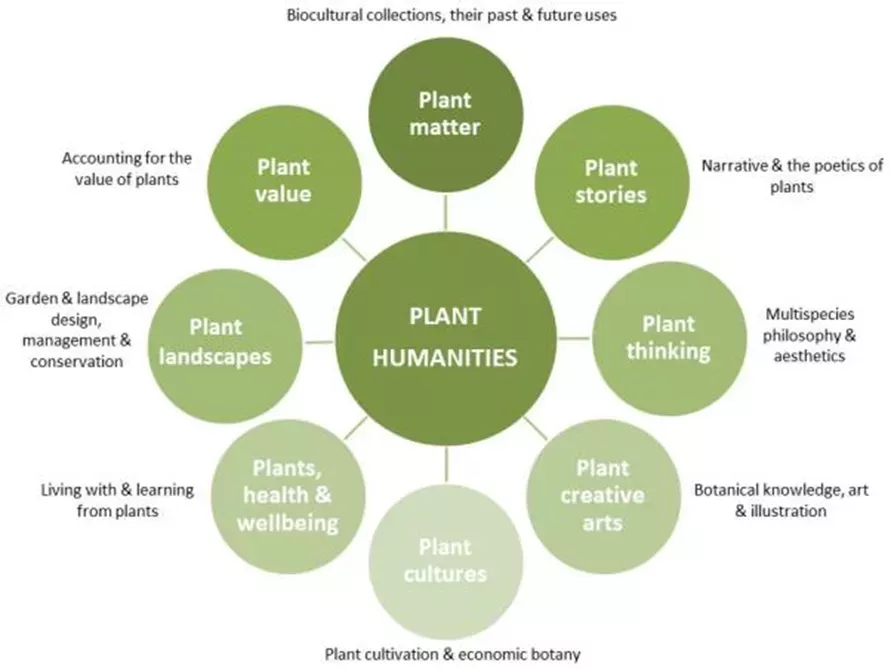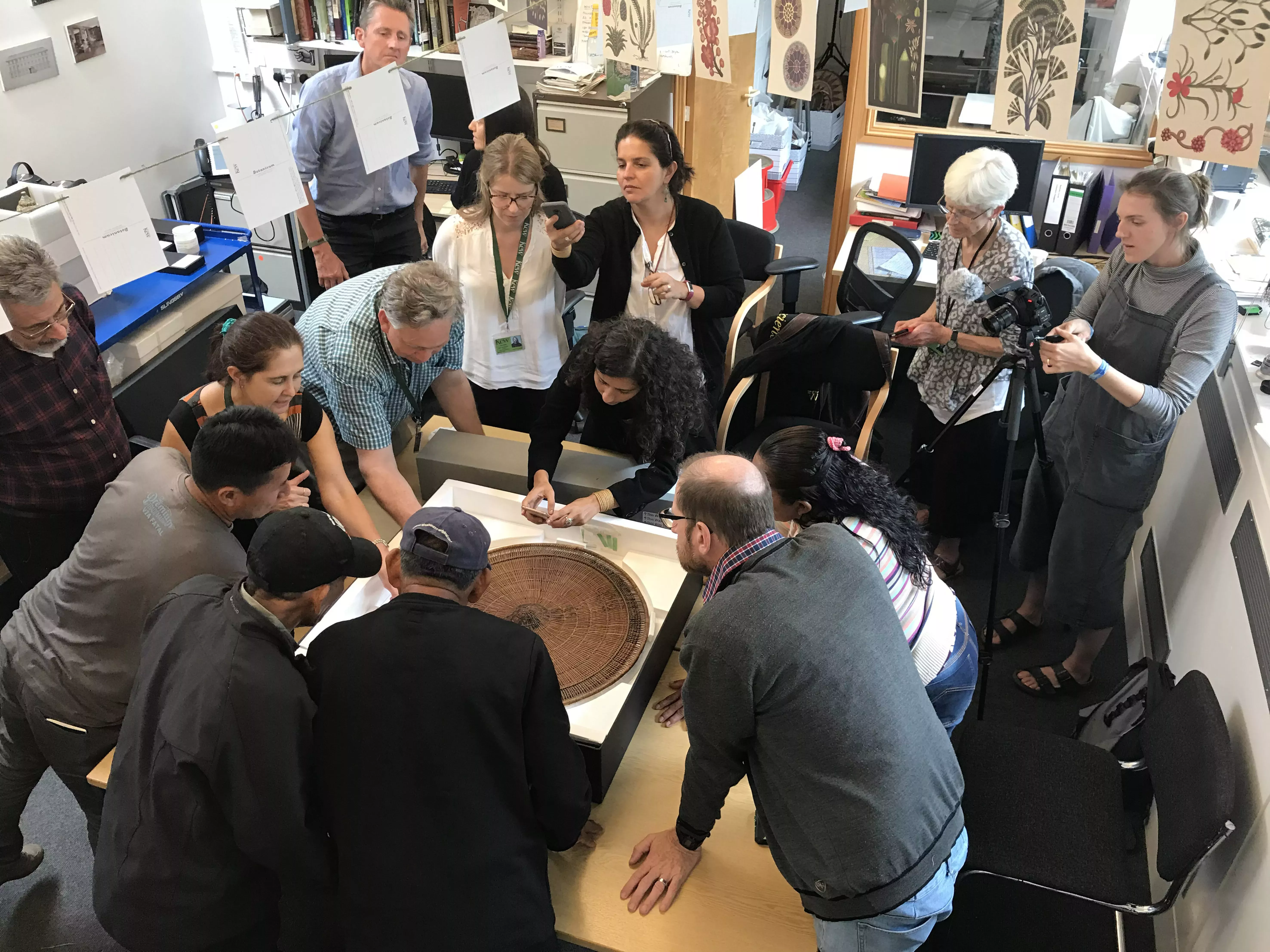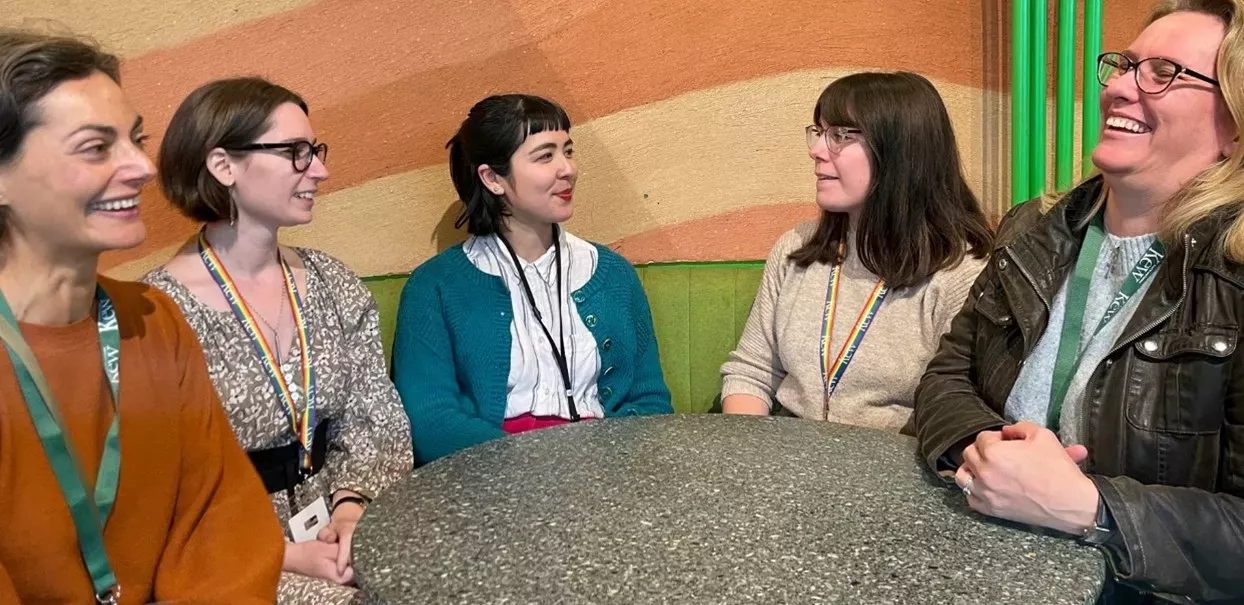Interdisciplinary Research
Supporting collaborative research at Kew in the arts, humanities, and social sciences

The mission of the Interdisciplinary Research group at Kew is to extend Kew’s reach and impact in science and public engagement through interdisciplinary research.
Using the framework of Plant Humanities, we support researchers from a broad range of disciplines - including art, anthropology, archaeology, ethnobotany, history (of art, of science, of design, of empire and post-empire, and of collections), geography, music, performance, and philosophy - to work with Kew’s collections and experts in creating new knowledge that will inform a variety of audiences: scientists, academics, visitors – both actual and digital, schools, and communities.

The Interdisciplinary Research team works with colleagues across the Kew and Wakehurst sites to develop new projects, often with external collaborators. The range of our work is wide, but is generally concerned with the relationships of people with plants, past, present and future.
For example, we have recently contributed to the development of funded projects in Kew teams as diverse as Policy, the Millennium Seedbank, Bioinformatics, and Accelerated Taxonomy. We have a good knowledge of research across Kew and are happy to make introductions as required.
We work particularly closely with two collections, Kew’s Library & Archives, and the Economic Botany Collection. Both these combine great utility for Kew’s scientific research, and status as important historical and cultural heritage. Current priorities within our team include:
- Interdisciplinary approaches to the study of neglected food plants, with the aim of supporting the conservation and use of endangered crop diversity, wild edible species and food heritage
- Supporting research into RBG Kew’s history and collections from diverse perspectives, and sharing an enriched understanding with Kew visitors and other audiences
- Enhanced cataloguing, digitisation and use of Kew’s Library, Archive and Art collections
- The repurposing of colonial biocultural collections, such as Kew’s Economic Botany collection, to address current day issues, for example by working with source communities, and with contemporary artists and designers
Our work is in partnership with a wide range of collaborating organisations − too many to list here − and is supported by funders including the Arts & Humanities Research Council, British Academy, Wellcome Trust, British Council, and Arts Council. Kew is recognised as an Independent Research Organisation by UKRI and is an active member of the Independent Research Organisation Consortium

- Pacific Barkcloth (Arts & Humanities Research Council)
- Hidden Histories: St Vincent Botanical Garden (AHRC)
- The Philosophical Life of Plants (AHRC)
- Mobile Museum (AHRC)
- People and Plants (AHRC)
- Agri-system histories: GCRF Food & Agricultural Heritage (AHRC)
- Where next? Plant Humanities (AHRC)
- Reconciling Medical Knowledge Communities: Learning from the History of Indian Plant Drugs (British Academy)
- Mobilising Richard Spruce’s 19th-century Amazon legacy (British Academy; Newton Fund)
- Miscellaneous Reports cataloguing project (Wellcome Trust)
- Plants and minerals in Byzantine popular pharmacy (Wellcome Trust)
- On colonisation, landscapes and living collections Shiraz Bayjoo
- Under the Varnish Tree & Paper Mulberry Siân Bowen
- Indigenous food systems, biocultural heritage, and agricultural resilience | Kew
- Evolutionary dynamics of vegetative agriculture in the Ethiopian Highlands | Kew
- AGRIHIST - Agri-system histories and trajectories | Kew
The Interdisciplinary Research team supports the Kew MSc programmes, particularly the joint MSc in Global Health: Food Security, Sustainability and Biodiversity with Royal Holloway, University of London.
The team also has long-standing arrangements for informal teaching with Masters’ programmes in the History of Design at the Royal College of Art, and Museum Studies and Object Conservation at University College London.
The team also leads on the development of collaborative PhDs in the arts, humanities, and social sciences. As of 2022 this is a cohort of 16 co-supervised students, accounting for about one in six of Kew’s overall PhD cohort. We work closely with the Science Training & Education team and welcome enquiries from prospective students and supervisors. Kew is a member of the TECHNE Doctoral Training Consortium and the Science Museums and Archives Consortium; we also work with many other consortia.

A small core team of staff works with a wider team of over 30 associated researchers and postgraduate students.
Staff
Prof. Mark Nesbitt, Senior Research Leader
Dr. Caroline Cornish, Humanities Research Coordinator
Dr. Philippa Ryan, Research Leader
Erin Messenger, Collection Manager
Gayathri Anand, Collections & Database Officer
Dr Aparajita Mukhopadhyay, Interdisciplinary Research Fellow
Honorary Research Associates
Prof. Felix Driver, Royal Holloway University of London
Prof. Christine Leon
Dr. Kate Teltscher, University of Roehampton
Visiting Researchers
Prof. Siân Bowen, Arts University Bournemouth
Prof. Luciana Martins, Birkbeck University of London
Dr. Diego Molina Franco, Royal Holloway University of London
Ruth Stungo, basket maker
PhD students
Catriona Sharples, University of Warwick
Christina Hourigan, Royal Holloway University of London
Heather Craddock, University of Roehampton
Harriet Gendall, University of Kent
Kimberly Glassman, Queen Mary University of London
Lindsay Sekulowicz, University of Brighton
Michelle Payne, Royal Holloway University of London
Pippa Pemberton, University of York
Sarah Laptain, University of York
Szymon Lara, University of West London
Viveca Mellegård, Royal Holloway University of London
Isobel Akerman, University of Cambridge
Jason Ng, King’s College London
Melanie Sirinathsingh, Goldsmiths, University of London
Aurora Prehn, Royal Holloway, University of London
We provide support and resource to researchers working at many levels:
- PhD
- PhD placements
- Postdoctoral opportunities (on research projects, or fellowships)
- Networks
- Research projects
- Artist residencies
We are most interested in research projects which are in some aspect:
- Connected to Kew’s research or collections
- Consistent with the Kew’s priority areas (geographically and strategically)
- Interdisciplinary, collaborating with Kew staff in a range of potential departments
- Jointly managed and, where appropriate, the recipient of joint funding
It is advisable to contact us at the earliest stage of project development, so that we can contribute to working out and costing research objectives.
To start a dialogue with Interdisciplinary Research at Kew email us at planthumanities@kew.org with a short proposal outlining:
- Research context
- Research questions
- Research methods
- Other information: number of people involved, anticipated duration, etc.
- Kew collections and/or staff you’d like to be involved
- Economic Botany Collection
- Kew Library
- Kew Archives
- Kew Science Collections Strategy
- Kew Science Strategy
-
RBG Kew's Manifesto for Change 2021-2030 (PDF) - Where Next: Plant Humanities Report